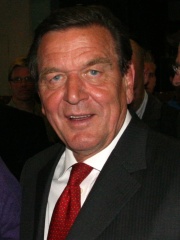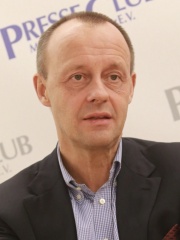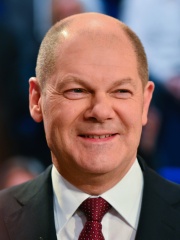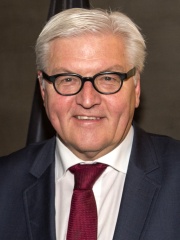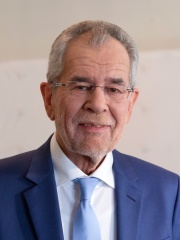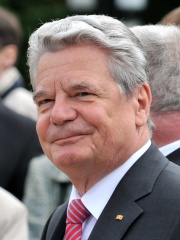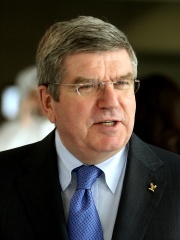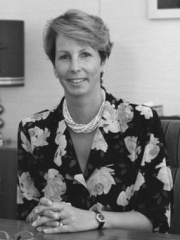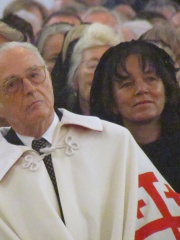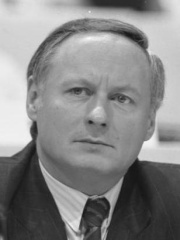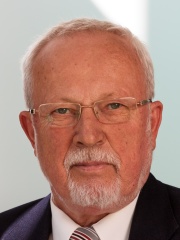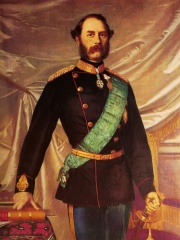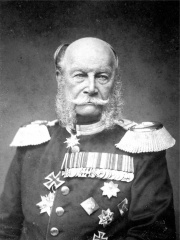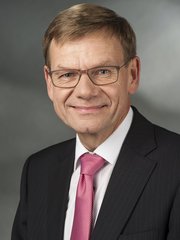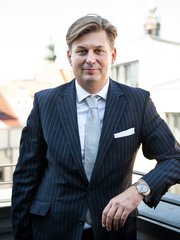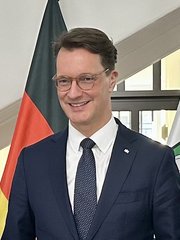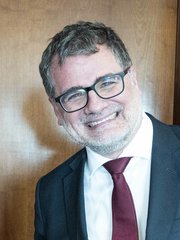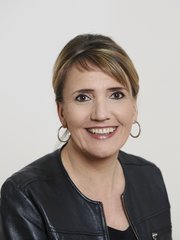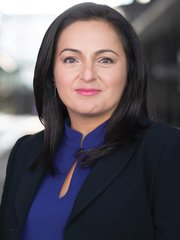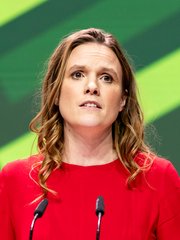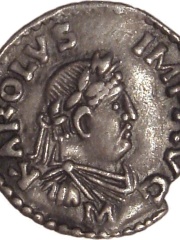

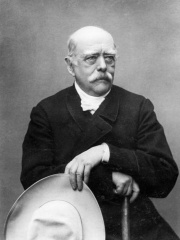
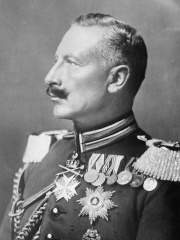
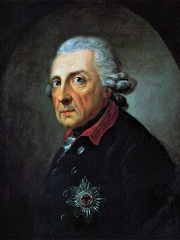
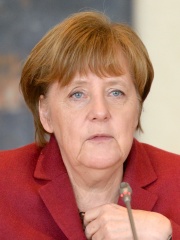
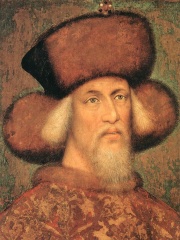
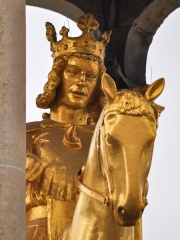
The Most Famous
POLITICIANS from Germany
This page contains a list of the greatest German Politicians. The pantheon dataset contains 19,576 Politicians, 1,391 of which were born in Germany. This makes Germany the birth place of the 2nd most number of Politicians.
Top 10
The following people are considered by Pantheon to be the top 10 most legendary German Politicians of all time. This list of famous German Politicians is sorted by HPI (Historical Popularity Index), a metric that aggregates information on a biography's online popularity. Visit the rankings page to view the entire list of German Politicians.

1. Charlemagne (748 - 814)
With an HPI of 89.85, Charlemagne is the most famous German Politician. His biography has been translated into 161 different languages on wikipedia.
Charlemagne ( SHAR-lə-mayn; 2 April 748 – 28 January 814) was King of the Franks from 768, King of the Lombards from 774, and Emperor of what is now known as the Carolingian Empire from 800. He united most of Western and Central Europe and was the first recognised emperor to rule from the west after the fall of the Western Roman Empire approximately three centuries earlier. Charlemagne's reign was marked by political and social changes that had lasting influence on Europe throughout the Middle Ages. A member of the Frankish Carolingian dynasty, Charlemagne was the eldest son of Pepin the Short and Bertrada of Laon. With his brother Carloman I, he became king of the Franks in 768 following Pepin's death and became the sole ruler three years later. Charlemagne continued his father's policy of protecting the papacy and became its chief defender, removing the Lombards from power in northern Italy in 774. His reign saw a period of expansion that led to the conquests of Bavaria, Saxony, and northern Spain, as well as other campaigns that led Charlemagne to extend his rule over a large part of Europe. Charlemagne spread Christianity to his new conquests (often by force), as seen at the Massacre of Verden against the Saxons. He also sent envoys and initiated diplomatic contact with Harun al-Rashid, the Abbasid caliph in the 790s, due to their mutual interest in Iberian affairs. In 800 Charlemagne was crowned emperor in Rome by Pope Leo III. Although historians debate the coronation's significance, the title represented the height of his prestige and authority. Charlemagne's position as the first emperor in the West in over 300 years brought him into conflict with the Eastern Roman Empire in Constantinople. Through his assumption of the imperial title, he is considered the forerunner to the line of Holy Roman Emperors, which persisted into the 19th century. As king and emperor, Charlemagne engaged in numerous reforms in administration, law, education, military organisation, and religion, which shaped Europe for centuries. The stability of his reign began a period of cultural activity known as the Carolingian Renaissance. Charlemagne died in 814 and was buried at the Palatine Chapel (now part of Aachen Cathedral) in Aachen, his imperial capital city. Charlemagne's influence on the Middle Ages and on the territory he ruled has led him to be called the "Father of Europe" by many historians. He is seen as a founding figure by multiple European states, and several historical royal houses of Europe trace their lineage back to him. Charlemagne has been the subject of artworks, monuments and literature during and after the medieval period.

2. Joseph Goebbels (1897 - 1945)
With an HPI of 88.81, Joseph Goebbels is the 2nd most famous German Politician. His biography has been translated into 103 different languages.
Paul Joseph Goebbels (29 October 1897 – 1 May 1945) was a German politician and philologist who was the Gauleiter (district leader) of Berlin, chief propagandist for the Nazi Party, and then Reich Minister of Propaganda from 1933 until his eventual suicide in 1945. He was one of Adolf Hitler's closest and most devoted followers and was known for his skills in public speaking and his virulent antisemitism which was evident in his publicly voiced views. He advocated for progressively harsher discrimination, including the extermination of Jews and other groups in the Holocaust. Born in Rheydt, Goebbels aspired to be an author and obtained a doctorate in philology from the University of Heidelberg in 1922. He joined the Nazi Party in 1924 and worked with Gregor Strasser in its northern branch. He was appointed Gauleiter of Berlin in 1926, where he began to take an interest in the use of propaganda to promote the party and its programme. After the Nazis came to power in 1933, Goebbels's Propaganda Ministry quickly gained control over the news media, arts and information in Nazi Germany. He was particularly adept at using the relatively new media of radio and film for propaganda purposes. Topics for party propaganda included antisemitism, attacks on Christian churches, and (after the start of the Second World War) attempts to shape troop and civilian morale. In 1943, Goebbels began to pressure Hitler to introduce measures that would produce "total war", including closing businesses not essential to the war effort, conscripting women into the labour force, and enlisting men in previously exempt occupations into the Wehrmacht. Hitler finally appointed him as Reich Plenipotentiary for Total War on 23 July 1944, whereby Goebbels undertook largely unsuccessful measures to increase the number of people available for armaments manufacture and the Wehrmacht. As the war drew to a close and Germany faced defeat, Magda Goebbels and the Goebbels children joined Hitler in Berlin. They moved into the underground Vorbunker, part of Hitler's underground bunker complex on 22 April 1945. Hitler committed suicide on 30 April. In accordance with Hitler's will, Goebbels succeeded him as Chancellor of Germany; he served one day in this post. The following day, Goebbels and his wife, Magda, committed suicide, after having poisoned their six children with a cyanide compound, which formally ended the reign of Nazi Germany's propaganda and anti-semitism.

3. Otto von Bismarck (1815 - 1898)
With an HPI of 88.67, Otto von Bismarck is the 3rd most famous German Politician. His biography has been translated into 155 different languages.
Otto Eduard Leopold, Prince of Bismarck, Count of Bismarck-Schönhausen, Duke of Lauenburg (; born Otto Eduard Leopold von Bismarck-Schönhausen; 1 April 1815 – 30 July 1898) was a German statesman and diplomat who oversaw the unification of Germany and served as its first chancellor from 1871 to 1890. Bismarck's Realpolitik and firm governance resulted in his being popularly known as the Iron Chancellor (Eiserner Kanzler). From Junker landowner origins, Bismarck rose rapidly in Prussian politics under King Wilhelm I of Prussia. He served as the Prussian ambassador to Russia and France and in both houses of the Prussian parliament. From 1862 to 1890, he held office as the minister president and foreign minister of Prussia. Under Bismarck's leadership, Prussia provoked three short, decisive wars against Denmark, Austria, and France. After Austria's defeat in 1866, he replaced the German Confederation with the North German Confederation, which aligned the smaller North German states with Prussia while excluding Austria. In 1870, Bismarck secured France's defeat with support from the independent South German states before overseeing the creation of a unified German Empire under Prussian rule. Following Germany's unification, he was given the aristocratic title Prince of Bismarck (Fürst von Bismarck). From 1871 onwards, his balance-of-power approach to diplomacy helped maintain Germany's position in a peaceful Europe. While averse to maritime colonialism, Bismarck acquiesced to elite and popular opinion by acquiring colonies. As part of his domestic political maneuvering, Bismarck created the first welfare state, with the goal of undermining his socialist opponents. In the 1870s, he allied himself with the low-tariff, anti-Catholic Liberals and fought the Catholic Church, in what was called the Kulturkampf (lit. 'culture struggle'). This was unsuccessful, with the Catholics responding by forming the powerful German Centre Party and using universal male suffrage to gain a bloc of seats. Bismarck responded by ending the Kulturkampf, breaking with the Liberals and forming a political alliance with the Centre Party to fight the Socialists. Under his direction, the Imperial Reichstag was sidelined and did not control government policy. A staunch monarchist, Bismarck ruled autocratically through a strong bureaucracy with power concentrated in the hands of the Junker elite. After being dismissed from office by Wilhelm II, he retired to write his memoirs. Bismarck is most famous for his role in German unification. During the German Imperial period, he became a hero to German nationalists, who built monuments honouring him. Historians praise him as a visionary who kept the peace in Europe through diplomacy. However, he has been criticized for his domestic policies such as his persecution of Catholics as well as his authoritarian rule in general as Chancellor.

4. Wilhelm II, German Emperor (1859 - 1941)
With an HPI of 88.47, Wilhelm II, German Emperor is the 4th most famous German Politician. His biography has been translated into 107 different languages.
Wilhelm II (English: Frederick William Victor Albert; German: Friedrich Wilhelm Viktor Albert; 27 January 1859 – 4 June 1941) was the last German Emperor and King of Prussia from 1888 until his abdication in 1918. His fall from power marked the end of the German Empire as well as the Hohenzollern dynasty's 500-year rule over Prussia and its predecessor state, Brandenburg. Born during the reign of his granduncle Frederick William IV of Prussia, Wilhelm was the son of Prince Frederick William and Victoria, Princess Royal. Through his mother, he was the eldest of the 42 grandchildren of Queen Victoria of the United Kingdom. In March 1888, Wilhelm's father, Frederick William, ascended the German and Prussian thrones as Frederick III. Frederick died just 99 days later, and his son succeeded him as Wilhelm II. In March 1890, the young Kaiser dismissed longtime Chancellor Otto von Bismarck and assumed direct control over his nation's policies, embarking on a "New Course" to cement Germany's status as a leading world power. Over the course of his reign, the German colonial empire acquired new territories in China and the Pacific (such as Jiaozhou Bay, the Northern Mariana Islands, and the Caroline Islands) and became Europe's largest manufacturer. However, Wilhelm often undermined such progress by making tactless and threatening statements towards other countries without first consulting his ministers. Likewise, his regime did much to alienate itself from other great powers by initiating a massive naval build-up, contesting French control of Morocco, and building a railway through Baghdad that challenged Britain's dominion in the Persian Gulf. By the second decade of the 20th century, Germany could rely only on significantly weaker powers such as Austria-Hungary and the declining Ottoman Empire as allies. Despite strengthening Germany's position as a great power by building a powerful navy as well as promoting scientific innovation within its borders, Kaiser Wilhelm's public pronouncements and erratic foreign policy greatly antagonized the international community and are considered by many to have contributed to the fall of the German Empire. In 1914, his diplomatic brinksmanship culminated in Germany's guarantee of military support to Austria-Hungary during the July Crisis which plunged all of Europe into World War I. A lax wartime leader, Wilhelm left virtually all decision-making regarding strategy and organisation of the war effort to the German Supreme Army Command. By August 1916, this broad delegation of power gave rise to a de facto military dictatorship that dominated the country's policies for the rest of the conflict. Despite emerging victorious over Russia and obtaining significant territorial gains in Eastern Europe, Germany was forced to relinquish all its conquests after a decisive defeat on the Western Front in the autumn of 1918. Losing the support of his country's military and many of his subjects, Wilhelm was forced to abdicate during the German Revolution of 1918–1919 which converted Germany into an unstable democratic state known as the Weimar Republic. Wilhelm subsequently fled to exile in the Netherlands, where he remained during its occupation by Nazi Germany in 1940 before dying there in 1941.
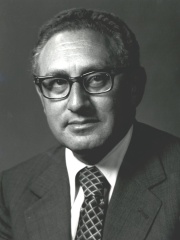
5. Henry Kissinger (1923 - 2023)
With an HPI of 87.92, Henry Kissinger is the 5th most famous German Politician. His biography has been translated into 104 different languages.
Henry Alfred Kissinger (May 27, 1923 – November 29, 2023) was an American diplomat and political scientist who served as the 56th United States secretary of state from 1973 to 1977 and the 7th national security advisor from 1969 to 1975, serving under presidents Richard Nixon and Gerald Ford. Born in Germany, Kissinger emigrated to the United States in 1938 as a Jewish refugee fleeing Nazi persecution. He served in the U.S. Army during World War II. After the war, he attended Harvard University, where he excelled academically. He later became a professor of government at the university and earned an international reputation as an expert on nuclear weapons and foreign policy. He acted as a consultant to government agencies, think tanks, and the presidential campaigns of Nelson Rockefeller and Nixon before being appointed as national security advisor and later secretary of state by President Nixon. An advocate of a pragmatic approach to geopolitics known as Realpolitik, Kissinger pioneered the policy of détente with the Soviet Union, orchestrated an opening of relations with China, engaged in "shuttle diplomacy" in the Middle East to end the Yom Kippur War, and negotiated the Paris Peace Accords, which ended American involvement in the Vietnam War. For his role in negotiating the accords, he was awarded the 1973 Nobel Peace Prize, which sparked controversy. Kissinger is also associated with controversial U.S. policies including its bombing of Cambodia, involvement in the 1971 Bolivian and 1973 Chilean coup d'états, and support for Argentina's military junta in its Dirty War, Indonesia in its invasion of East Timor, and Pakistan during the Bangladesh Liberation War and Bangladesh genocide. Considered by many American scholars to have been an effective secretary of state, Kissinger was also accused by critics of war crimes for the civilian death toll of the policies he pursued and for his role in facilitating U.S. support for authoritarian regimes. After leaving government, Kissinger founded Kissinger Associates, an international geopolitical consulting firm which he ran from 1982 until his death. He authored over a dozen books on diplomatic history and international relations. His advice was sought by American presidents of both major political parties.

6. Frederick the Great (1712 - 1786)
With an HPI of 85.80, Frederick the Great is the 6th most famous German Politician. His biography has been translated into 91 different languages.
Frederick II (German: Friedrich II.; 24 January 1712 – 17 August 1786) was the monarch of Prussia from 1740 until his death in 1786. He was the last Hohenzollern monarch titled King in Prussia, declaring himself King of Prussia after annexing Royal Prussia from the Polish–Lithuanian Commonwealth in 1772. His most significant accomplishments include military successes in the Silesian wars, reorganisation of the Prussian Army, the First Partition of Poland, and patronage of the arts and the Enlightenment. Prussia greatly increased its territories and became a major military power in Europe under his rule. He became known as Frederick the Great (German: Friedrich der Große) and was nicknamed "Old Fritz" (German: der Alte Fritz). In his youth, Prince Frederick was more interested in music and philosophy than war, which led to clashes with his authoritarian father, Frederick William I of Prussia. However, upon ascending to the throne, he attacked and annexed the rich Austrian province of Silesia in 1742, winning military acclaim. He became an influential military theorist, whose analyses emerged from his extensive personal battlefield experience and covered issues of strategy, tactics, mobility and logistics. Frederick was a supporter of enlightened absolutism, stating that the ruler should be the first servant of the state. He modernised the Prussian bureaucracy and civil service, and pursued religious policies that ranged from tolerance to segregation. He reformed the judicial system and made it possible for men of lower status to become judges and senior bureaucrats. Frederick encouraged immigrants of diverse backgrounds to come to Prussia. While Protestantism remained the favored faith, he allowed religious freedom and tolerated Jews and Catholics in Prussia, however his actions were not entirely without prejudice. He supported the arts and philosophers he favoured, and allowed freedom of the press and literature. Frederick was almost certainly homosexual, and his sexuality has been the subject of much study. Because he died childless, he was succeeded by his nephew, Frederick William II. He is buried at his favourite residence, Sanssouci in Potsdam. Nearly all 19th-century German historians made Frederick into a romantic model of a glorified warrior, praising his leadership, administrative efficiency, devotion to duty and success in building Prussia into a great power. Frederick remained an admired historical figure through Germany's defeat in World War I, and the Nazis glorified him as a great German leader prefiguring Adolf Hitler, who personally idolised him. His reputation became less favourable in Germany after World War II, partly due to being symbolically adopted by the Nazis as a historical hero. Historians in the 21st century tend to view Frederick as an outstanding military leader and capable monarch, whose commitment to enlightenment culture and administrative reform built the foundation that allowed the Kingdom of Prussia to contest the Austrian Habsburgs for leadership among the German states.

7. Angela Merkel (b. 1954)
With an HPI of 85.63, Angela Merkel is the 7th most famous German Politician. Her biography has been translated into 169 different languages.
Angela Dorothea Merkel (German pronunciation: [aŋˈɡeːla doʁoˈteːa ˈmɛʁkl̩] ; née Kasner; born 17 July 1954) is a German retired politician who served as Chancellor of Germany from 2005 to 2021. She is the only woman to have held the office and the only from former East Germany. She was Leader of the Opposition from 2002 to 2005 and Leader of the Christian Democratic Union (CDU) from 2000 to 2018. Merkel was born in Hamburg in West Germany. Her family moved to East Germany when she was an infant. A member of the communist East German Free German Youth (FDJ), Merkel obtained a doctorate in quantum chemistry in 1986 and worked as a research scientist until 1989. She then entered politics in the wake of the Revolutions of 1989, briefly serving as deputy spokeswoman for the first democratically elected government of East Germany, led by Lothar de Maizière. Following German reunification in 1990, Merkel was elected to the Bundestag for the state of Mecklenburg-Vorpommern. As the protégée of Chancellor Helmut Kohl, Merkel was appointed as Minister for Women and Youth in 1991, later becoming Minister for the Environment, Nature Conservation and Nuclear Safety in 1994. After the CDU lost the 1998 federal election, Merkel was elected general secretary of the party. She then became the party's first female leader, and the first female leader of the Opposition, two years later. Following the 2005 federal election, Merkel was elected chancellor, leading a grand coalition consisting of the CDU, the Christian Social Union (CSU), and the Social Democratic Party of Germany (SPD). She was the first woman to be elected chancellor, and the first chancellor of reunified Germany to have been raised in the former East Germany. In the 2009 federal election, the CDU obtained the largest share of the vote, and Merkel subsequently formed a coalition government with the Free Democratic Party (FDP), an alliance more favourable to the CDU than the grand coalition. In the 2013 federal election, the CDU won a landslide victory and formed a second grand coalition with the SPD, after the FDP lost all of its representation in the Bundestag. In the 2017 federal election, Merkel led the CDU to become the largest party for the fourth time, resulting in the formation of a third grand coalition with the SPD. In foreign policy, Merkel emphasised international cooperation, both in the context of the EU and NATO, and initiating the Russian reset and strengthening of Eurasian and transatlantic economic relations. In the first half of 2007, Merkel served as president of the European Council and played a central role in the negotiation of the Treaty of Lisbon and the Berlin Declaration. Merkel's governments managed the 2008 financial crisis and the Euro area crisis. She negotiated the 2008 European Union stimulus plan, which focused on infrastructure spending and public investment to counteract the Great Recession. Also in 2008, she actively blocked the access of Ukraine and Georgia in the enlargement of NATO during the 2008 Bucharest summit. In domestic policy, Merkel's Energiewende programme supported the development of renewable energy sources and eventually phased out the use of nuclear power in Germany. Despite the 2014 Russian annexation of Crimea, which prompted sanctions around the world, she initiated the construction of the controversial Nord Stream 2 pipelines to Russia and protected their construction from United States sanctions imposed in 2019. Reforms to the Bundeswehr, health care reform, the 2010s European migrant crisis, and the COVID-19 pandemic were major issues during her chancellorship. Merkel stepped down as leader of the CDU in 2018 and did not seek a fifth term as chancellor in the 2021 federal election. Following the Russian invasion of Ukraine, her legacy came under increased scrutiny both in Germany and abroad for her relatively good relations with Russia and increasing the German economy's dependence on Russia, as well as the downsizing of the Bundeswehr that occurred during her tenure.

8. Sigismund, Holy Roman Emperor (1368 - 1437)
With an HPI of 85.25, Sigismund, Holy Roman Emperor is the 8th most famous German Politician. His biography has been translated into 66 different languages.
Sigismund of Luxembourg (15 February 1368 – 9 December 1437) was Holy Roman Emperor from 1433 until his death in 1437. As the husband of Mary, Queen of Hungary, he was King of Hungary and Croatia (jure uxoris) from 1387. He was elected King of Germany (King of the Romans) in 1410, and was also King of Bohemia from 1419, as well as prince-elector of Brandenburg (1378–1388 and 1411–1415). He was the last male member of the House of Luxembourg. Sigismund was the son of Charles IV, Holy Roman Emperor and his fourth wife Elizabeth of Pomerania. He married Mary, Queen of Hungary in 1385 and was crowned King of Hungary soon after. He fought to restore and maintain authority to the throne. Mary died in 1395, leaving Sigismund the sole ruler of Hungary. In 1396, Sigismund led the Crusade of Nicopolis but was decisively defeated by the Ottoman Empire. Afterwards, he founded the Order of the Dragon to fight the Turks and secured the thrones of Croatia, Germany and Bohemia. Sigismund was one of the driving forces behind the Council of Constance (1414–1418) that ended the Papal Schism, but which also led to the Hussite Wars that dominated the later period of his life. In 1433, Sigismund was crowned Holy Roman Emperor and ruled until his death in 1437. Historian Thomas Brady Jr. remarks that Sigismund "possessed a breadth of vision and a sense of grandeur unseen in a German monarch since the thirteenth century". He realized the need to carry out reforms of the empire and the Church at the same time. However external difficulties, self-inflicted mistakes and the extinction of the Luxembourg male line made this vision unfulfilled. Later, the Habsburgs would inherit this mission and imperial reform was carried out successfully under the reigns of Frederick III and especially his son Maximilian I, although perhaps at the expense of the reform of the Church, partly because Maximilian was not particularly focused on the matter. In recent years, scholarly interest (especially from East-Central Europe) has grown greatly in the person and reign of Sigismund—the ruler who had gained and led an imperial association almost reaching the size of the later Habsburg Empire—as well as cultural developments associated with his era. The setbacks which have been seen as his major failures (like dealing with the Hussite movement) are now generally considered by most scholars to be the results of the lack of financial resources and other heavy constraints, rather than personal failings.

9. Otto I, Holy Roman Emperor (912 - 973)
With an HPI of 84.97, Otto I, Holy Roman Emperor is the 9th most famous German Politician. His biography has been translated into 83 different languages.
Otto I (23 November 912 – 7 May 973), known as Otto the Great (German: Otto der Große; Italian: Ottone il Grande) or Otto of Saxony (German: Otto von Sachsen; Italian: Ottone di Sassonia), was East Frankish (German) king from 936 and Holy Roman Emperor from 962 until his death in 973. He was the eldest son of Henry the Fowler and Matilda of Ringelheim. Otto inherited the Duchy of Saxony and the kingship of the Germans upon his father's death in 936. He continued his father's work of unifying all German tribes into a single kingdom and greatly expanded the king's powers at the expense of the aristocracy. Through strategic marriages and personal appointments, Otto installed members of his family in the kingdom's most important duchies. This reduced the various dukes, who had previously been co-equals with the king, to royal subjects under his authority. Otto transformed the church in Germany to strengthen royal authority and subjected its clergy to his personal control. After putting down a brief civil war among the rebellious duchies, Otto defeated the Magyars at the Battle of Lechfeld in 955, thus ending the Hungarian invasions of Western Europe. The victory against the pagan Magyars earned Otto a reputation as a savior of Christendom and secured his hold over the kingdom. By 961, Otto had conquered the Kingdom of Italy. Following the example of Charlemagne's coronation as "Emperor of the Romans" in 800, Otto was crowned emperor in 962 by Pope John XII in Rome. Otto's later years were marked by conflicts with the papacy and struggles to stabilize his rule over Italy. Reigning from Rome, Otto sought to improve relations with the Byzantine Empire, which opposed his claim to emperorship and his realm's further expansion to the south. To resolve this conflict, the Byzantine princess Theophanu married his son Otto II in April 972. Otto finally returned to Germany in August 972 and died at Memleben in May 973. Otto II succeeded him. Otto has been consistently depicted in historiography through different eras as a successful ruler. He is also reputed to be a great military commander, especially on the strategic level – this also means that the empire this talent recreated was too vast for contemporary administrative structures and could only be governed as a confederacy. Modern historians, while not denying his strong character and his many fruitful initiatives, explore the emperor's capability as a consensus builder – a process that goes in parallel with greater recognition of the nature of consensus politics in medieval Europe (especially Western and Central parts) as well as different roles played by other actors in his time. Historian David Bachrach notes the role of the bureaucracy and administration apparatus which the Ottonians inherited from the Carolingians and ultimately from the Ancient Romans, and which they developed greatly themselves: "It was the success of the Ottonians in molding the raw materials bequeathed to them into a formidable military machine that made possible the establishment of Germany as the preeminent kingdom in Europe from the tenth through the mid-thirteenth century." Bachrach highlights in particular the achievements of the first two Ottonian rulers, Henry I and Otto the Great in creating this situation. Their rules also marked the start of new, vigorous literary traditions. The patronage of Otto and his immediate successors facilitated a so-called "Ottonian Renaissance" of arts and architecture. As one of the most notable Holy Roman emperors, Otto's footprint in artistic depictions is also considerable.

10. Heinrich Himmler (1900 - 1945)
With an HPI of 84.86, Heinrich Himmler is the 10th most famous German Politician. His biography has been translated into 93 different languages.
Heinrich Luitpold Himmler (German: [ˈhaɪnʁɪç ˈluːɪtpɔlt ˈhɪmlɐ] ; 7 October 1900 – 23 May 1945) was a German Nazi politician and military leader. He was the 4th Reichsführer of the Schutzstaffel (Protection Squadron; SS) from 1929 to 1945. He was a leading member of the Nazi Party, and one of the most powerful figures in Nazi Germany. He was also one of the main architects of the Holocaust, the genocide of the Jewish population of Europe. After serving in a reserve battalion during World War I without seeing combat, Himmler went on to join the Nazi Party in 1923. In 1925, he joined the SS, which was initially a small paramilitary arm of the Nazi Party that served as a bodyguard unit for Adolf Hitler. Himmler rose steadily through the SS's ranks to become Reichsführer-SS by 1929. Under Himmler's leadership, the SS grew from a 290-man battalion into one of the most powerful institutions in Nazi Germany. Over the course of his career, Himmler acquired a reputation for good organisational skills and for selecting highly competent subordinates, such as Reinhard Heydrich. From 1943 onwards, he was both Chief of the Kriminalpolizei (Criminal Police) and Minister of the Interior, which gave him oversight of all police and security forces (including the Gestapo). He also controlled the Waffen-SS, a branch of the SS that served in combat alongside the Wehrmacht (Germany's armed forces) in World War II. As the principal enforcer of the Nazis' racial policies, Himmler was responsible for operating concentration and extermination camps as well as forming the Einsatzgruppen death squads in German-occupied Europe. In this capacity, he played a central role in the genocide of an estimated 5.5–6 million Jews and the deaths of millions of other victims during the Holocaust. A day before the launch of Operation Barbarossa in June 1941, Himmler commissioned the drafting of Generalplan Ost, which was approved by Hitler in May 1942 and implemented by the Nazi regime, resulting in the deaths of approximately 14 million people in Eastern Europe. In the last years of World War II, Hitler appointed Himmler as Commander of the Replacement Army and General Plenipotentiary for the administration of the Third Reich (Generalbevollmächtigter für die Verwaltung). He was later given command of the Army Group Upper Rhine and the Army Group Vistula. He failed to achieve his assigned objectives, and Hitler replaced him in these posts. Realising the war was lost, Himmler attempted, without Hitler's knowledge, to open peace talks with the western Allies in March 1945. When Hitler learned of this on 28 April, he dismissed Himmler from all his posts and ordered his arrest. Himmler attempted to go into hiding but was captured by British forces. He died by suicide in British custody on 23 May 1945.
People
Pantheon has 1,391 people classified as German politicians born between 15 and 2002. Of these 1,391, 226 (16.25%) of them are still alive today. The most famous living German politicians include Angela Merkel, Gerhard Schröder, and Friedrich Merz. The most famous deceased German politicians include Charlemagne, Joseph Goebbels, and Otto von Bismarck. As of April 2024, 30 new German politicians have been added to Pantheon including Johann Wadephul, Anke Rehlinger, and Maximilian Krah.
Living German Politicians
Go to all RankingsAngela Merkel
1954 - Present
HPI: 85.63
Gerhard Schröder
1944 - Present
HPI: 80.17
Friedrich Merz
1955 - Present
HPI: 78.54
Olaf Scholz
1958 - Present
HPI: 77.93
Frank-Walter Steinmeier
1956 - Present
HPI: 76.70
Alexander Van der Bellen
1944 - Present
HPI: 75.94
Joachim Gauck
1940 - Present
HPI: 75.32
Thomas Bach
1953 - Present
HPI: 70.13
Sabine Bergmann-Pohl
1946 - Present
HPI: 69.31
Franz, Duke of Bavaria
1933 - Present
HPI: 67.68
Oskar Lafontaine
1943 - Present
HPI: 67.33
Lothar de Maizière
1940 - Present
HPI: 66.80
Deceased German Politicians
Go to all RankingsCharlemagne
748 - 814
HPI: 89.85
Joseph Goebbels
1897 - 1945
HPI: 88.81
Otto von Bismarck
1815 - 1898
HPI: 88.67
Wilhelm II, German Emperor
1859 - 1941
HPI: 88.47
Henry Kissinger
1923 - 2023
HPI: 87.92
Frederick the Great
1712 - 1786
HPI: 85.80
Sigismund, Holy Roman Emperor
1368 - 1437
HPI: 85.25
Otto I, Holy Roman Emperor
912 - 973
HPI: 84.97
Heinrich Himmler
1900 - 1945
HPI: 84.86
Hermann Göring
1893 - 1946
HPI: 84.02
Christian IX of Denmark
1818 - 1906
HPI: 83.50
William I, German Emperor
1797 - 1888
HPI: 83.14
Newly Added German Politicians (2025)
Go to all RankingsJohann Wadephul
1963 - Present
HPI: 56.19
Anke Rehlinger
1976 - Present
HPI: 45.83
Maximilian Krah
1977 - Present
HPI: 45.70
Dorothee Bär
1978 - Present
HPI: 45.52
Hendrik Wüst
1975 - Present
HPI: 45.20
Heidi Reichinnek
1988 - Present
HPI: 45.09
Amira Mohamed Ali
1980 - Present
HPI: 44.50
Wolfgang Schmidt
1970 - Present
HPI: 44.44
Simone Peter
1965 - Present
HPI: 43.49
Sandra Schmitt
1981 - 2000
HPI: 42.50
Sevim Dağdelen
1975 - Present
HPI: 42.44
Terry Reintke
1987 - Present
HPI: 42.13
Overlapping Lives
Which Politicians were alive at the same time? This visualization shows the lifespans of the 25 most globally memorable Politicians since 1700.

